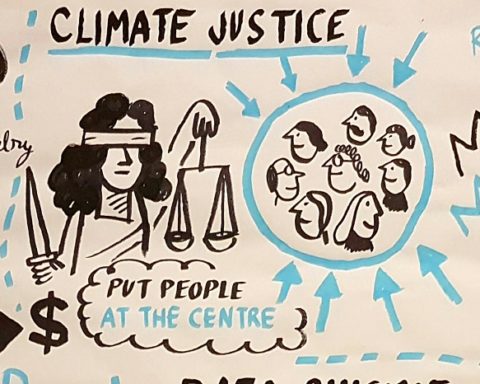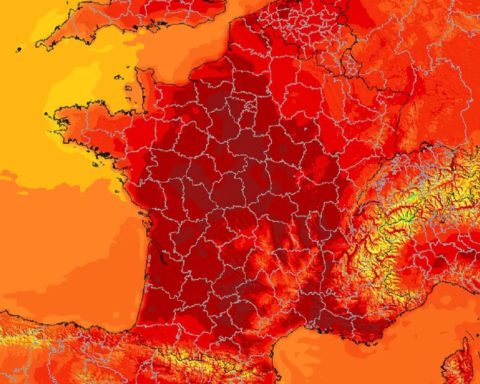We're not introducing Nicholas Stern anymore, Sir Nicholas Stern. This economist became famous for his report on climate change published in 2006. It was the first time that the climate was taken out of the realm of scientists and environmentalists and approached from a macro-economic perspective. A few days before the opening of COP 21, Nicholas Stern published a call for rich countries to respect their commitment to provide 100 billion dollars to developing countries in order to defeat climate change. He concludes his appeal by touching on the political leaders' sore point: " they] must recognize that financial support to poor countries in the fight against global warming is not only a moral imperative, it is also in the interest of their own constituents ... and the world's population.. »
A strong voice that should be heard.
« En 2009, the world's rich countries pledged to raise $100 billion a year by 2020 to help poor countries fight global warming. Since then, this pledge has been seen as the key test of the developed world's willingness to assume its share of responsibility in this fight.
It is crucial that the rich countries achieve this 100 billion target. Poor countries must be convinced that they will keep their promise. If they do not, the prospect of an international climate agreement could be lost and reduce the likelihood of success at the UN conference in Paris in November and December.
Fortunately, there are encouraging signs that this commitment could be met. But more money is needed, especially from the private sector. According to the OECD and the Climate Policy InitiativeTogether, developed countries have raised $52.2 billion in 2013 and $61.8 billion in 2014 to help poor countries reduce greenhouse gas emissions and combat the consequences of global warming that have become unavoidable.
These figures are only estimates based on information provided by developed countries. Nevertheless, they are a credible indicator of the financing of the fight against global warming. Assuming an underestimation of the private sector's contribution, these figures are lower than the reality, and assuming an overestimation of the dedicated sums from international aid and multilateral development banks, they are higher than the reality.
In making their estimates, the researchers took into account major public and private sector investments in a wide range of projects. These include funding for small-scale renewable energy projects in Uganda by the United Kingdom, Germany, Norway and the European Union, and that of the Pan-African Risk Management Mutual (ARC, African Risk Capacity) supported by the United Kingdom and Germany, which insures states against the risk of drought and other natural disasters.
Researchers indicate that their estimates may be lower than the reality because they have only limited data. Nevertheless, they highlight the relatively low level of private sector investment in actions to increase the resilience of poor countries. This is both a challenge and an opportunity: with the right incentives, private sector investment in building the resilience of poor countries could grow rapidly, which would be a major step towards achieving the $100 billion target.
Achieving this goal requires greater trust in the institutions and policies of the countries in which the money is to be used. New processes are needed to reduce and share risks. This requires, inter alia, reliance on development banks and bilateral cooperation institutions.
This new funding for the fight against global warming must be added to the ever-increasing budgets that will have to be devoted to sustainable development over the coming decades. Among other things, it must create and implement the measures, regulations and framework that provide incentives for investors - which could be a very powerful multiplier.
According to the World Commission on Economics and Climate, over the next 15 years, it will be necessary to spend some 90 trillion dollars for infrastructure, mainly in developing and emerging countries that are experiencing rapid growth and urbanization. If this infrastructure is dependent on fossil fuels, it will be very difficult to reduce greenhouse gas emissions at the global level.
On the other hand, if the international community properly finances the transition to low-carbon economies, it will stimulate innovation and pave the way for decades of sustainable growth. Global warming budgets should therefore be used to encourage investment public and private investment in low-carbon technologies and infrastructure. This will lower the cost of capital - which is crucial for scaling up large-scale projects and encouraging the switch to renewable energy.
Furthermore, the financing of the fight against global warming by rich countries will help to improve the resilience to global warming of most vulnerable countries. It must be used to avoid deforestation and to protect biodiversity and threatened resources such as oceans. It should stimulate innovation and open up new opportunities for climate action, in particular new areas of collaboration between the public and private sectors, for example on carbon capture and storage projects.
Part of the $100 billion will be distributed through the newly created Green Climate Fund; but the multilateral development banks must also have a central role, alongside national institutions. Funds spent on sustainable development and climate action should be mutually reinforcing. Developing country finance ministers should recall that combating global warming stimulates growth and poverty reduction, reduces air pollution and promotes energy conservation.
Ultimately, success will depend on the willingness of rich countries to keep their promises. Their leaders must recognize that financial support for poor countries in the fight against global warming is not only a moral imperative, it is also in the interest of their own constituents ... and the world's population. »
Nicholas Stern
Translated from the English by Patrice Horovitz












